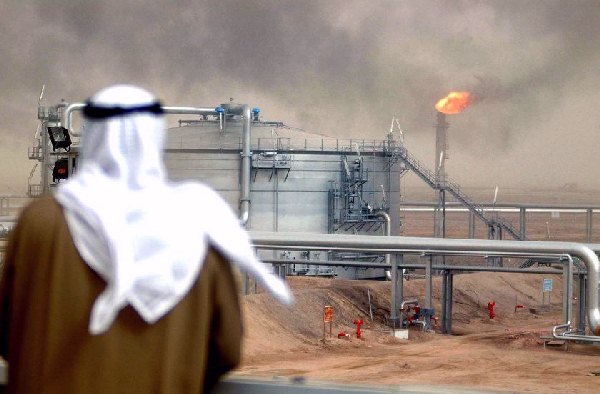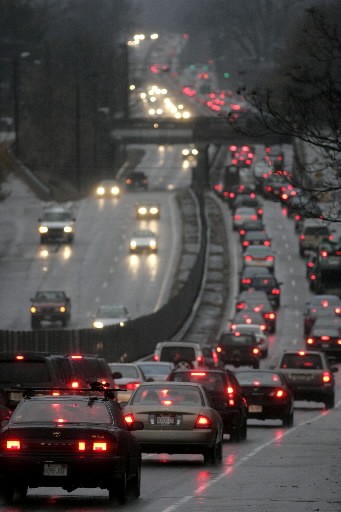|
|
|||||||||||||||||||||||||||||||
|
OPEC Predicts $170 / Barrel Oil
Oil prices could hit $170, says OPECJune 26th 2008 - Crude oil prices could rise to as high as $170 per barrel in the coming months but are unlikely to hit $200 and should ease towards the end of the year, OPEC President Chakib Khelil said in an interview on Thursday. "I forecast prices probably between $150-170 during this summer. That will perhaps ease towards the end of the year," he told France 24 television, according to a text of the interview released by the station. The comments came as crude prices neared $135 per barrel, after rising about 40 per cent this year. Khelil said he doubted prices would climb as high as $200. "I think that the devaluation of the dollar against the euro, if everything goes as I think it will, will be of the order of perhaps 1-2 per cent and this will probably generate an $8 rise in the price of oil," he said. The head of the Organization of the Petroleum Exporting Countries, said it had been clearly established that speculation was affecting markets. "It's not a question, but a certainty. The problem is the extent of that speculation on the market," he said, adding that the effect of the subprime crisis in the United States had affected oil markets. Asked what the main factor behind the rise in prices had been, he replied: "I think it's the devaluation of the dollar." "You can see, every time the dollar strengthens, there is a fall in prices," he said. Khelil reiterated that OPEC tried to meet the demands of the market, as its statutes required. "It's very difficult now to find a market. If you tell me there is someone to whom we haven't sold oil and who needs it, I'd see, but right now I put my oil on the market and I don't find buyers," Khelil, who is also Algeria's energy minister said. Asked whether OPEC could change its stance against increasing supply at its next meeting on Sept. 9, he said: "Yes, of course, we will review the situation of the market, based on demand. If there is real demand on the market, OPEC will take the necessary measures to satisfy that demand."
Oil crosses 140 dollars for first timeJune 26th 2008 - Oil prices crossed 140 dollars a barrel for the first time in New York and London Thursday amid a declining dollar and after OPEC warned prices could hit 170 dollars this year. New York's main oil futures contract, light sweet crude for August delivery, shot up 5.50 dollars to trade as high as 140.05 dollars per barrel. In London, Brent North Sea crude for August jumped 6.05 dollars to 140.38 dollars. The price of crude oil shot up on the new dollar weakness, which makes the dollar-denominated commodity cheaper for buyers using stronger currencies. The dollar lost ground against the euro a day after the Federal Reserve left interest rates unchanged. Analysts at Barclays Capital said interest rates in the United States were likely to remain lower than those set by the European Central Bank for the eurozone, making the euro more attractive to investors than the US unit. The president of the Organization of the Petroleum Exporting Countries, Algerian Energy Minister Chakib Khelil, said crude could hit a record 170 dollars this year owing to a weak US currency and geopolitical unrest. "I predict probably prices of 150 to 170 dollars this summer," Khelil said Thursday in an interview with France 24. "It (the market) will probably fall a bit towards the end of the year." The OPEC president added that a weak dollar was the main cause of surging oil prices.
10 million fewer U.S. vehicles predicted by 2012June 26th 2008 - Gasoline prices are becoming so high that one of Canada’s top banks is predicting a “mass exodus” of vehicles from U.S. highways within four years, with a slightly less dramatic drop expected in Canada. CIBC World Markets said in a report today that gas prices in the U.S. will hit US$7 a gallon — the equivalent of C$1.86 a litre — two summers from now. That marks a 70 per cent increase over today’s record levels. As a result, there will be about 10 million fewer vehicles on U.S. roads by 2012 and average kilometres driven will drop 15 per cent, the report said. “Over the next four years, we are likely to witness the greatest mass exodus of vehicles off America’s highways in history,” chief economist Jeff Rubin wrote. The meteoric rise in crude oil prices, which hit a record US$140 a barrel on the New York Mercantile Exchange today, has been a major factor in soaring pump prices.
CIBC predicts crude will hit $200 a barrel by 2010The average pump price in Canada today was C$1.38 a litre, nearly 30 cents higher than what it was a year ago, according to the price-tracking website Gasbuddy.com. Americans were paying US$4.07 a gallon, the equivalent of C$1.08 a litre. Canada will only experience about 70 per cent of the U.S. decrease in driving, CIBC senior economist Benjamin Tal said. “Canada will feel the pain, but it’s not going to be the same as in the U.S.,” Tal said in an interview, noting that there will be about 700,000 fewer cars on Canadian roads by 2012 and a 10 per cent decrease in average kilometres driven. In the U.S. case, low-income families will account for the biggest change, whereas in Canada the greatest shift will come from the middle-income bracket, Tal said. “In Canada, more low-income Canadians have access to public transportation, therefore the adjustment will not come from them. The adjustment will come from middle class families that will start giving up the second or third cars,” he said, adding that much of the higher tax Canadians pay tends to be invested in urban transit systems. Another report today from Scotia Economics said record-high gas prices are leading to a big change in purchasing habits. “With Americans abandoning their gas-guzzling SUVs and pickup trucks for small, more fuel-efficient vehicles, we estimate that the average fuel-efficiency of this year’s fleet has climbed by nearly 20 per cent from the previous model year,” said auto industry specialist Carlos Gomes. Small cars now account for one-quarter of overall U.S. sales, up from 16 per cent last year, the Scotia report said. “In fact, small cars and fuel-efficient crossover utility vehicles now account for 42 per cent of the U.S. market, up from 30 per cent in 2006 and double their sheared as recently as 2001,” Gomes said. One the other hand, sales of pickups and SUVs are down to only 19 per cent of U.S. volumes, compared to 36 per cent in 2001. The trend is less pronounced in Canada, where there has been traditionally been a greater appetite for fuel-efficient vehicles, Gomes said in an interview. “The Canadian market has always been a bit different. We always tended to drive smaller vehicles than was the case in the United States,” he said. U.S. auto sales this year are expected dip to 14.7 million units from 16 million units last year, Gomes said. But he said sales are expected to remain strong in Canada, where many automakers have been ratcheting down their prices.
|
|
||||||||||||||||||||||||||||||
|
Website Design + SEO by designSEO.ca ~ Owned + Edited by Suzanne MacNevin | |||||||||||||||||||||||||||||||


